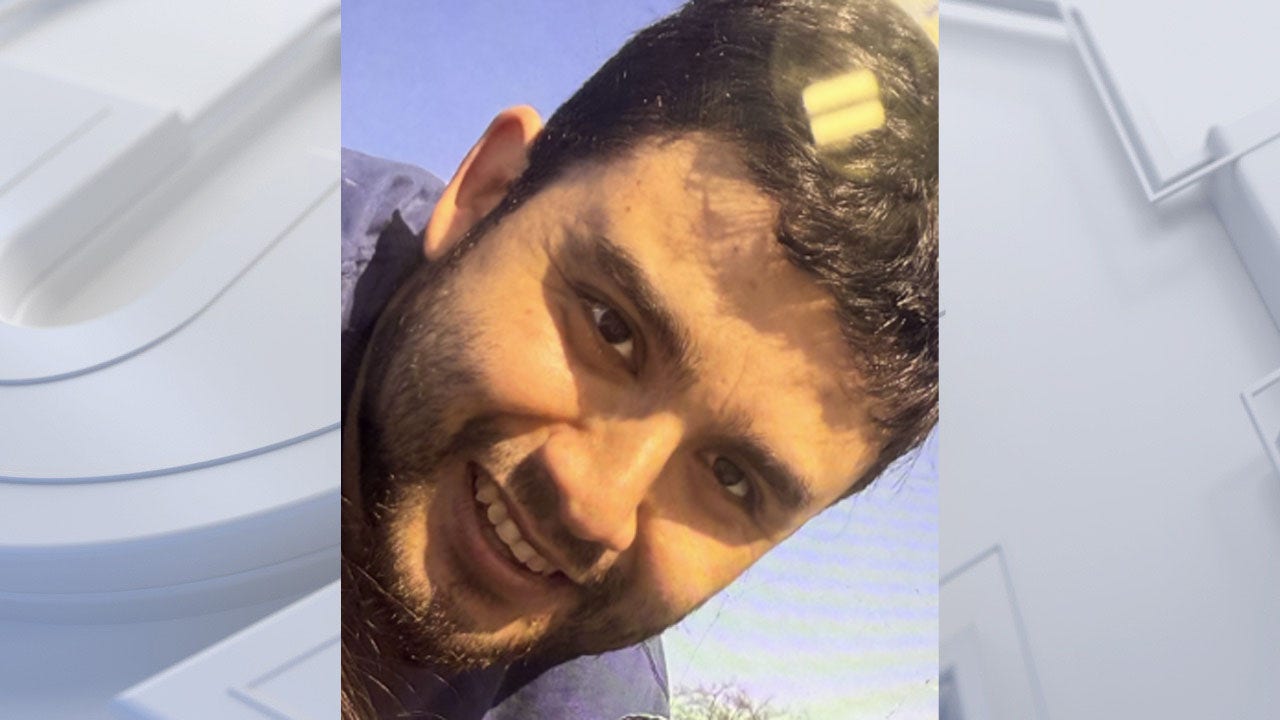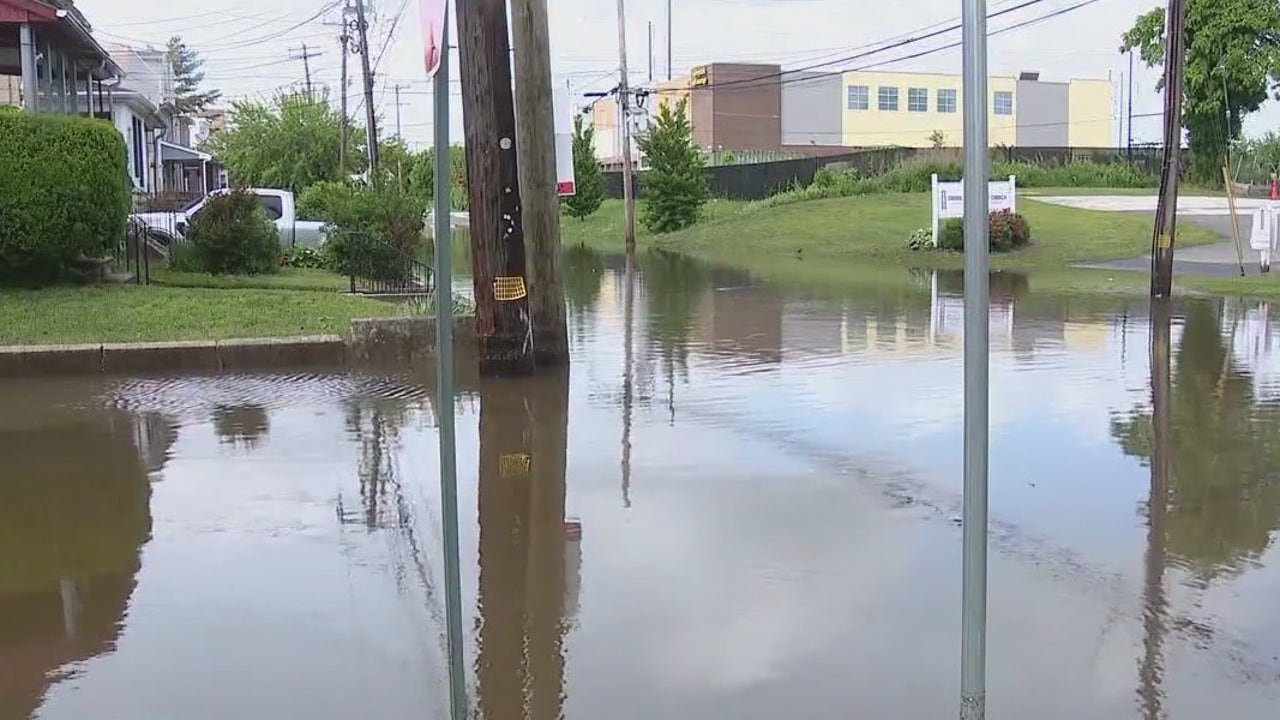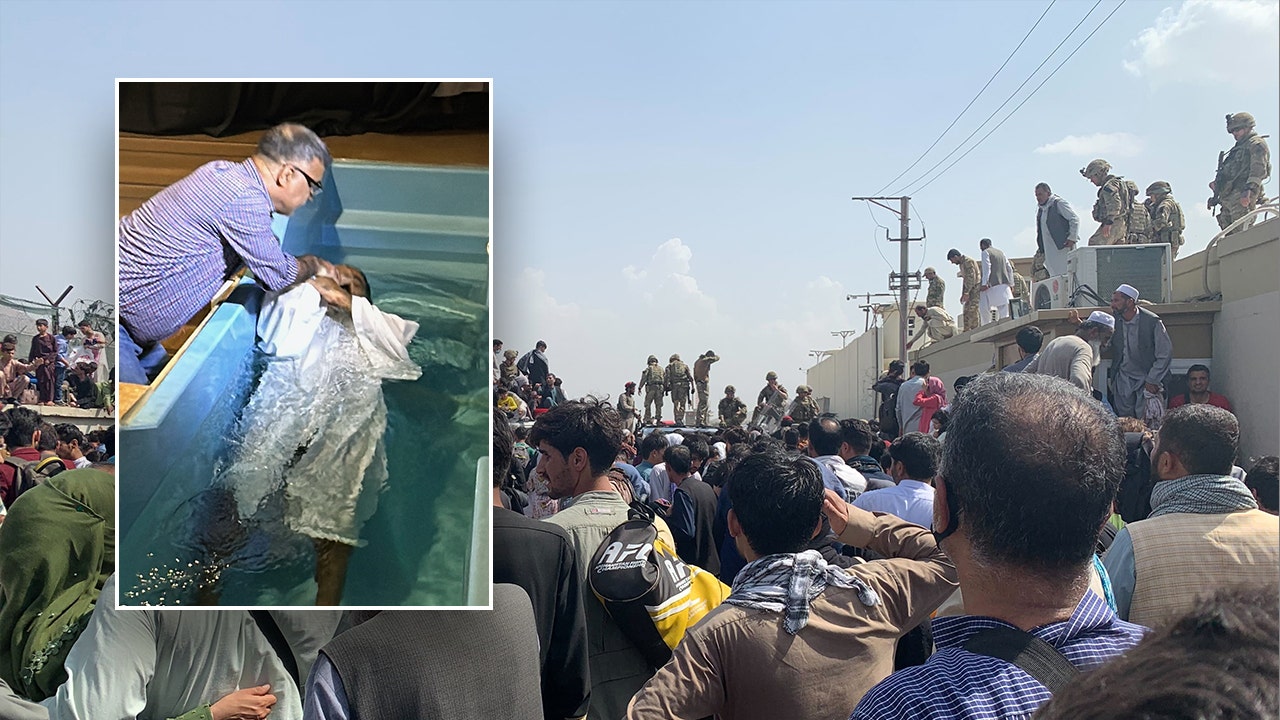World
Syria brought Wagner Group fighters to heel as mutiny unfolded in Russia
/cloudfront-us-east-2.images.arcpublishing.com/reuters/CNNFNGOLGFI2DGLIUOKPRQ3Z2M.jpg)
BEIRUT, July 7 (Reuters) – As Wagner mercenaries advanced on Moscow in an attempted mutiny in late June, authorities in Syria and Russian military commanders there took a series of swift measures against local Wagner operatives to prevent the uprising spreading, according to six sources familiar with the matter.
The previously unreported crackdown included blocking phone lines, summoning around a dozen Wagner commanders to a Russian military base, and ordering mercenary fighters to sign new contracts with the Russian defence ministry or promptly leave Syria, according to the sources, who include Syrian security officials, sources based near deployed Russian forces, and regional officials.
The sources declined to be named in order to discuss sensitive military information. Syria’s government, Russia’s defence ministry and Wagner in Russia did not respond to requests for comment.
The measures showed how Syrian authorities moved quickly to bring the mercenary force to heel, worried that their key military partner Russia was distracted by events back home, according to two Syrian sources informed of the deployments.
“Wagner’s role in Syria – as it was playing it before – is over,” said Nawar Shaban, researcher at Omran Center for Strategic Studies, an Istanbul-based independent research group focused on Syria. “Given the events, their relationship with the Syrian defence ministry is now over.”
Damascus has not publicly commented on the June 23-24 Wagner mutiny in which mercenary boss Yevgeny Prigozhin ordered his men fighting for Russia in Ukraine to march on Moscow before a deal brokered by Belarus saw them turn back and many exiled.
However, senior Syrian military and intelligence officials privately voiced concern as they watched events unfolding that the mutiny could disrupt the Russian military presence they had relied on for so long, according to a senior Syrian Republican Guard officer and a Syrian source briefed on developments.
The mercenary group’s presence in Syria is relatively small at between 250 and 450 personnel, or roughly a tenth of the estimated Russian military strength, the two Syrian sources said. There are no official figures on staffing, which vary over time.
Russia deployed its military forces and, crucially, its airpower to Syria in 2015, helping President Bashar al-Assad beat back rebels intent on toppling him.
Wagner has since been involved in combat missions and security for oil installations in Syria, with the first suspected Wagner deaths there reported as early as 2015.
For years, Moscow denied any connection with Wagner, but the group has played a very public role in Russia’s war in Ukraine. President Vladimir Putin said after the mutiny that his government funds the group.
After Prigozhin announced his uprising, a group of Russian military officers were quickly dispatched to Syria to help take charge of Wagner forces there, according to a regional military source close to Damascus and two Syrian sources with knowledge of the events, who did not provide further details.
Syria’s military intelligence cut landlines and internet links overnight on Friday June 23 from areas where Russian Wagner forces were deployed to prevent them from communicating among themselves, with Wagner in Russia, and even with relatives back home, the three sources said.
By the morning of Saturday June 24, Syrian military intelligence and Russian defence officials were coordinating closely to isolate and control Wagner operatives, according to the senior Republican Guard officer, a Syrian security source and two Syrian sources briefed on the developments.
Around a dozen Wagner officers deployed in Syria’s central province of Homs and other areas were summoned to Russia’s operational base at Hmeimim in western Latakia province, according to the Republican Guard officer and one of the Syrian sources briefed on the developments. The officer said this occurred “in the early hours of the mutiny.”
Reuters could not determine what happened to them. The Russian Reconciliation Center for Syria, headquartered in the Hmeimim base, refers all media enquiries to the defence ministry, which did not respond to requests for comment.
NEW CONTRACTS OR FLIGHTS OUT
By June 24, Wagner fighters in Syria were asked to sign new contracts by which they report directly to Russia’s defence ministry, a source with knowledge of Wagner’s deployments and two other sources with knowledge of the events said.
Their pay was also cut, those three sources said.
Those who refused the terms were flown out on Russian Ilyushin planes in the following days, two of those sources said. One said they numbered “in the dozens,” surprising Syrian officials who expected more would refuse and head into exile.
Between June 25 and 27, flight-tracking data from Flightradar24 shows at least three trips by a Russian Ilyushin plane between Latakia, Syria and Bamako, the capital of the West African nation of Mali, where Wagner also has operations. Reuters could not establish whether Wagner personnel were on board the flights.
Mali authorities did not respond to a request for comment on the flights and whether any Wagner fighters had been redeployed from Syria to Mali.
Wagner had already pulled many experienced Russian fighters out of Syria last year to fight in Ukraine following Russia’s full-scale invasion, according to Syrian analysts and a retired Syrian military officer familiar with Wagner activities.
Wagner fighters secured Syrian oilfields and Western officials say Wagner is linked to Evro Polis, a company that profits from those assets. The EU imposed sanctions on the firm in 2021.
Reuters was unable to determine the fate of those commercial interests in the wake of the Russian defence ministry’s moves against Wagner in Syria and Russia. Evro Polis did not immediately respond to emails sent to a contact address on its website.
Hmeimim base has served as a logistics hub to transit Wagner fighters on to Libya and elswhere in Africa, according to a Syrian security source and a Western diplomat based in the region. “We are watching how those Wagner operations will in turn be disrupted,” the diplomat said.
Unlike its other operations in Africa, where Wagner’s presence is larger and not subservient to the Russian military, its role in Syria’s war went little noticed at first, as Russian air power turned the tide of the conflict.
Details of its presence emerged gradually, notably in 2018 when hundreds of Wagner fighters were killed in a confrontation with U.S. forces near the Syrian city of Deir al-Zor, sources told Reuters at the time.
In the wake of the Wagner uprising, Syria’s leadership quickly restated publicly the importance of its military alliance with Russia.
Syrian first lady Asmaa al-Assad was in Russia days later to attend her son’s graduation from Moscow State University and was asked by a reporter whether she had been afraid to visit given recent events.
“Our Russian friends did not hesitate when they stood with us in our war. So we did not hesitate, and we won’t hesitate, to stand with them in their war,” she said.
Additional reporting by Laila Bassam and Tom Perry in Beirut and Ed McAllister in and Joanna Plucinska in London; Editing by Mike Collett-White and Daniel Flynn
Our Standards: The Thomson Reuters Trust Principles.

World
Nicusor Dan Beats George Simion in Romana’s Presidential Election

In a setback for Europe’s surging nationalist forces, Nicusor Dan, a centrist mayor and former mathematics professor, on Sunday won the presidential election in Romania, defeating a hard-right candidate who is aligned with President Trump and has opposed military aid to Ukraine.
With more than 98 percent of ballots counted, preliminary official results gave 54 percent of the vote in the presidential runoff to Mr. Dan, 55, the mayor of Romania’s capital, Bucharest. His opponent, George Simion, a nationalist and fervent admirer of Mr. Trump who had been widely seen as the front-runner, drew only 46 percent.
As he slipped behind Mr. Dan in early counting, Mr. Simion told supporters that “we are the clear winners of these elections.” He called for national protests should the final count show him as the loser, railing against what he said was an attempt “to steal the victory of the Romanian people.”
Mr. Dan’s victory will likely calm fears in Europe’s political mainstream that Romania, which borders Ukraine and plays a vital role in defending NATO’s eastern flank against Russia, might join Hungary and Slovakia in opposing help for Ukraine and in cozying up to Moscow.
But it will likely inflame Romania’s nationalist camp and its supporters abroad, including Vice President JD Vance, and stoke accusations that the system is rigged. Last year, a Romanian court ordered a last-minute cancellation of a presidential election that an ultranationalist appeared well positioned to win.
In the final days of the campaign, as opinion polls showed the race tightening, Mr. Simion laid the groundwork for a Romanian version of Mr. Trump’s “stop the steal” efforts in 2020. He insisted that only electoral fraud could prevent him from winning.
On Sunday, shortly before voting ended, Mr. Simion claimed that “many deceased people” had appeared on electoral lists, echoing the claims of Mr. Trump after he lost the 2020 election in the United States. Mr. Simion provided no evidence to support accusations that his victorious rival had benefited from fraud.
A mathematics prodigy in his youth who earned a Ph.D. in France before becoming a professor in Bucharest, Mr. Dan campaigned as a moderate conservative committed to both the European Union, which Romania joined in 2007, and to NATO, which it has been a member of since 2004.
Though supported, at least tacitly, by much of Romania’s political establishment, Mr. Dan ran as an independent and presented himself as an outsider untainted by close association with Romania’s two main political parties. Those parties have cycled in and out of power since the 1989 overthrow of communist dictator Nicolae Ceausescu.
Mr. Dan began his public career campaigning against corruption and the destruction of old buildings by real estate developers tied to corrupt politicians. Both candidates were involved in rallies in the early 2000s to save Bucharest’s historic center.
But while Mr. Simion embraced nationalist politics, campaigning to “unite” Romania with the former Soviet republic of Moldova, which is largely Romanian-speaking, and bits of Ukraine inhabited by ethnic Romanians, Mr. Dan pursued a more moderate agenda.
Mr. Dan helped found the Save Romania Union, a liberal party, but split with it over the issue of same-sex marriage, which progressives in the party supported. When Romania, at the urging of right-wing activists, held a referendum in 2018 on changing the Constitution to prohibit same-sex unions, Mr. Dan urged his party to stay out of the issue. The referendum failed because of low turnout.
Leftists view him as a conservative and nationalists as a sellout to the European Union, but his victory on Sunday indicated that voters wanted a middle path between bitterly polarized political camps.
Campaigning this past week, he said voters had a choice “between a democratic, stable and respected Romania in Europe — and a dangerous path of isolation, populism and defiance of the rule of law.”
Andrada Lautaru contributed reporting from Bucharest.
World
Pope Leo XIV vows to work for unity, peace during inaugural mass
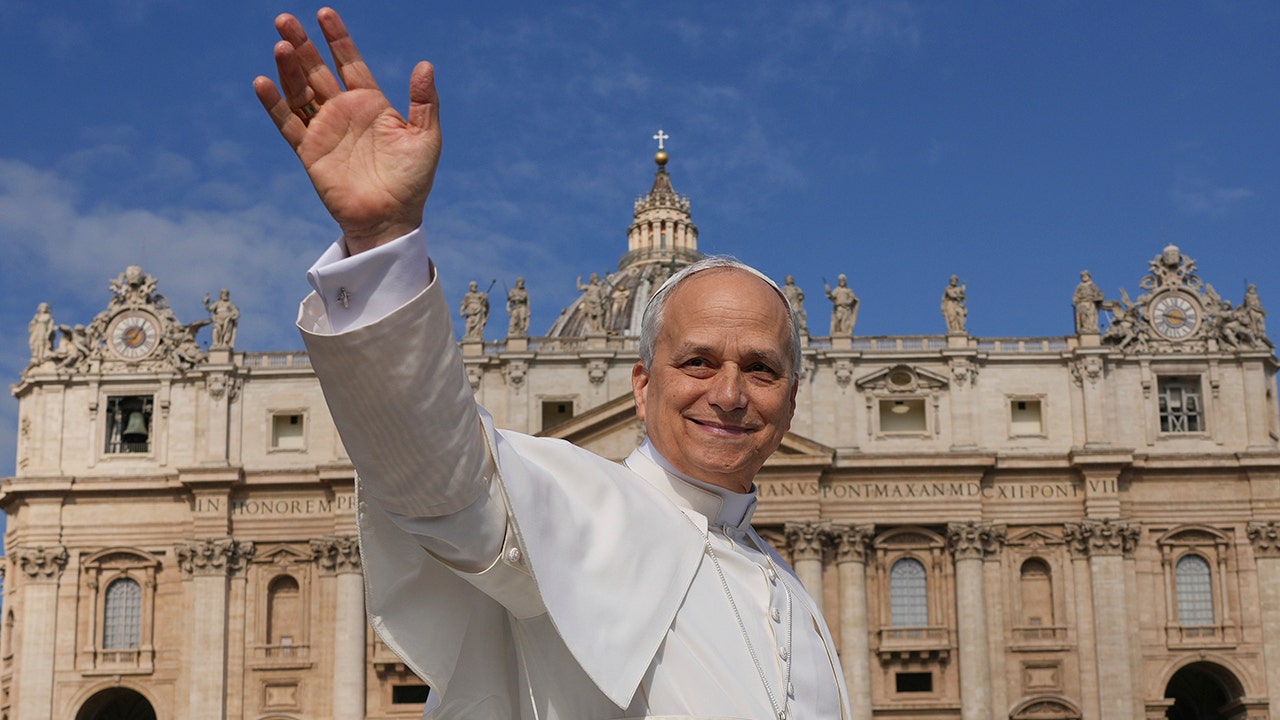
Pope Leo XIV spoke of unity and those suffering due to war during his inaugural mass in St. Peter’s Square.
The 69-year-old Augustinian missionary, who is the first American pope, spoke before 200,000 people on Sunday, Vatican News said.
“I would like that our first great desire be for a united church, a sign of unity and communion, which becomes a leaven for a reconciled world,” he said during his homily, the Associated Press reported.
“In this our time, we still see too much discord, too many wounds caused by hatred, violence, prejudice, the fear of difference, and an economic paradigm that exploits the Earth’s resources and marginalizes the poorest.”
POPE LEO SAYS FAMILY BASED ON ‘UNION BETWEEN A MAN AND A WOMAN,’ DEFENDS DIGNITY OF UNBORN
Pope Leo XIV holds Mass during the formal inauguration of his pontificate in St. Peter’s Square attended by heads of state, royalty and ordinary faithful, Sunday, May 18, 2025. (Alessandra Tarantino)
His call for unity was significant, given the polarization in the Catholic Church in the United States and beyond.
“In the joy of faith and communion, we cannot forget our brothers and sisters who are suffering because of war,” Leo said while praying the Regina Caeli, mentioning Gaza, Myanmar and Ukraine.
IN PICTURES: POPE LEO XIV ADDRESSES 150,000 FAITHFUL IN INAUGURAL MASS
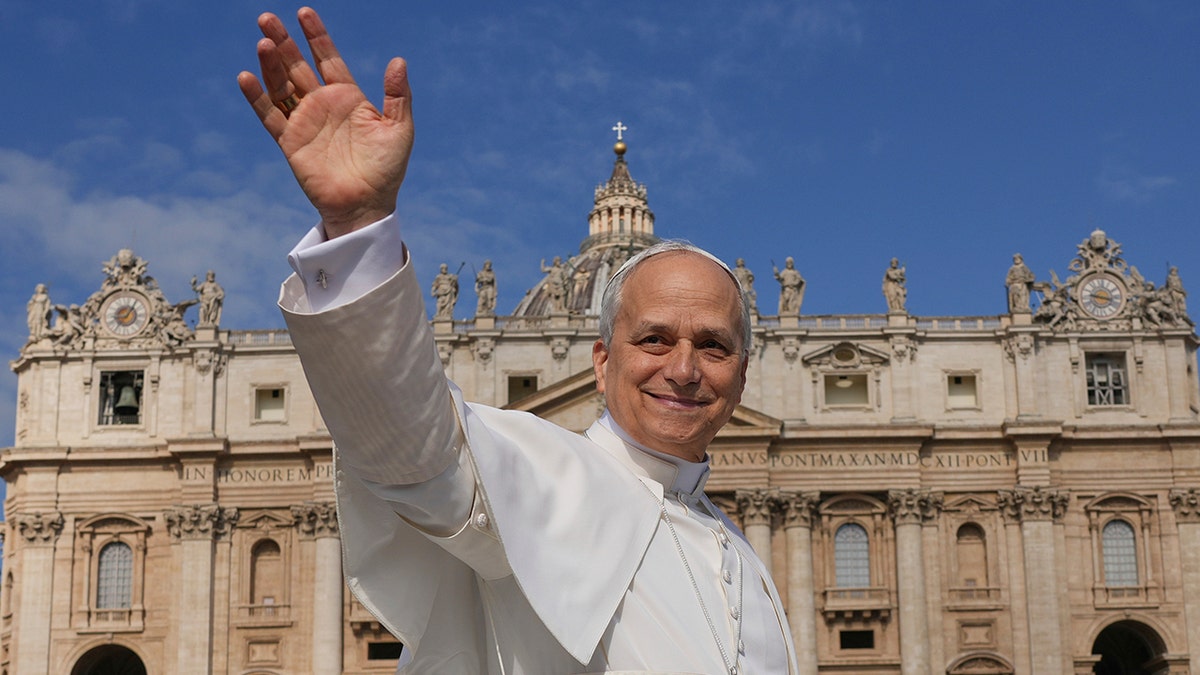
Pope Leo XIV on his popemobile tours St. Peter’s Square at the Vatican prior to the inaugural Mass of his pontificate, Sunday, May 18, 2025. (Andrew Medichini)
The pope said he “strongly felt the spiritual presence of Pope Francis accompanying us from heaven.”
He concluded by inviting Catholics to pray to the Blessed Virgin Mary, under her titles as “Star of the Sea and Our Lady of Good Counsel,” to entrust his ministry.
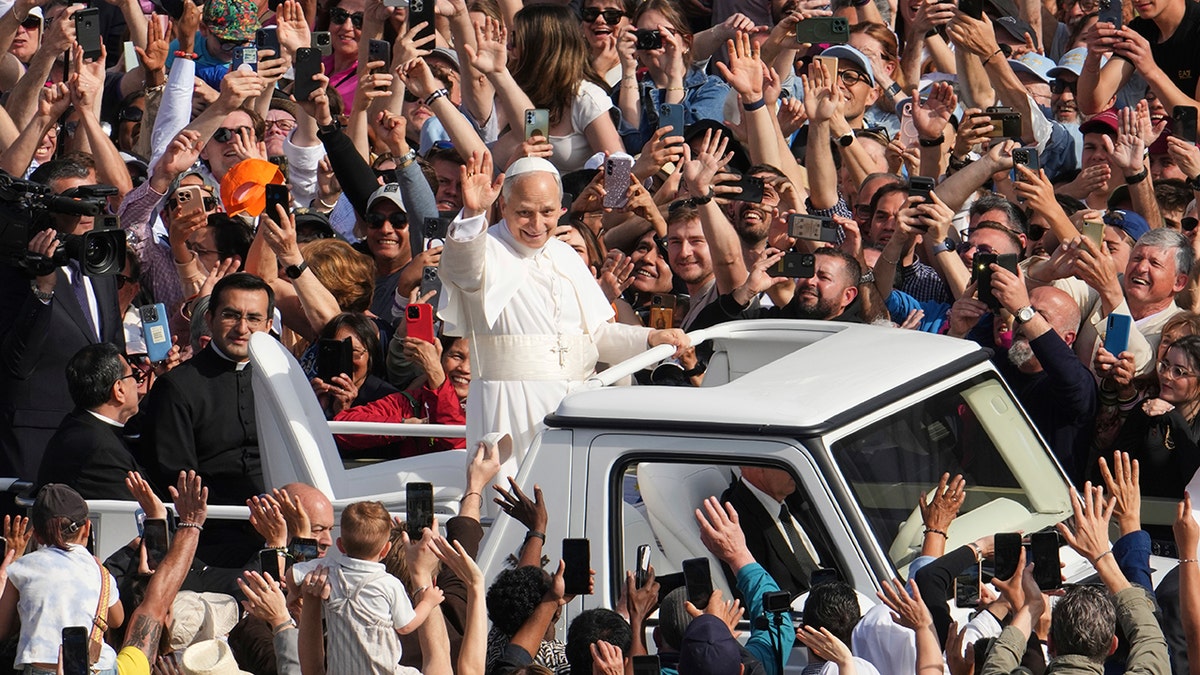
Pope Leo XIV on his popemobile tours St. Peter’s Square at the Vatican prior to the inaugural Mass of his pontificate, Sunday, May 18, 2025. (Domenico Stinellis)
“We implore her intercession,” he said, “for the gift of peace, for support and comfort for those who suffer, and for the grace for all of us to be witnesses to the Risen Lord.”
Leo officially opened his pontificate by taking his first popemobile tour through the piazza, a rite of passage that has become synonymous with the papacy’s global reach.
The Associated Press contributed to this report.
World
Portuguese PM’s party set to win general election, fall short of majority

Portugal’s ruling centre-right Democratic Alliance (AD) is poised to win the most votes in an early parliamentary election, but is short of a full majority, exit polls have shown, paving the way for more political instability in the country.
Sunday’s election, the third in as many years, was called just one year into the minority government’s term after Prime Minister Luis Montenegro failed to win a parliamentary vote of confidence in March when the opposition questioned his integrity over the dealings of his family’s consultancy firm.
Montenegro has denied any wrongdoing, and most opinion polls showed that voters have dismissed the opposition’s criticism.
The election, also dominated by issues such as housing and immigration, follows a decade of fragile governments. And the only one of those governments to have a parliamentary majority collapsed halfway through its term last year.
Exit polls published by the three main television channels – SIC, RTP and TVI – put Montenegro’s AD as receiving between 29 percent and 35.1 percent of the vote, garnering the biggest share but again no parliamentary majority, similar to what happened in the previous election in March 2024.
Outside the polling station where Montenegro voted in the northern city of Espinho, Irene Medeiros, 77, told Reuters the “best candidate must win”, but that she feared more uncertainty ahead.
According to the exit polls, Montenegro’s main rival, the centre-left Socialist Party (PS), garnered between 19.4 percent and 26 percent of the vote, nearly tied with the far-right Chega party’s 19.5 percent to 25.5 percent share, which is higher than the 18 percent it won in 2024. Montenegro has refused to make any deals with Chega.
With that tally, the DA could get between 85 and 96 seats, short of the 116 needed for a majority in Portugal’s 230-seat parliament. It could form a minority government or forge partnerships with smaller parties to obtain a majority.
Most official results are expected by midnight (23:00 GMT).
For the last half century, two parties have dominated politics in Portugal, with the Social Democrats, who head the DA, and the PS alternating in power.
Public frustration with their record in government has fuelled the search and for growth of new alternatives in recent years.
“This campaign was very, very weak, had ridiculous moments, like clownish. Very little was spoken about Portugal within the European Union – it’s like we are not part of it,” teacher Isabel Monteiro, 63, told the Associated Press news agency in Lisbon, adding that she felt “disenchantment” with all parties.
Political scientist Antonio Costa Pinto said the new parliament would likely be similar to the last, and it was impossible to predict how long the government would last, as it depended on factors ranging from the international situation to the AD’s ability to reach deals with other parties.
“The only doubt is whether the AD will form a new minority government … or whether it will form a post-electoral coalition with IL, even if this coalition does not guarantee an absolute majority,”, referring to the pro-business Liberal Initiative (IL) party, according to Reuters.
Shortly after casting his own ballot, Montenegro told reporters he was confident stability could be achieved.
“There is a search for a stable solution, but that will now depend on [people’s] choices,” he said.
A second consecutive minority government in Portugal would dash hopes for an end to the worst spell of political instability in decades for the European Union country of 10.6 million people.
For the past 50 years, two parties have dominated politics, with the Social Democrats, who head the DA, and the Socialist Party alternating in power.
-

 Austin, TX1 week ago
Austin, TX1 week agoBest Austin Salads – 15 Food Places For Good Greens!
-
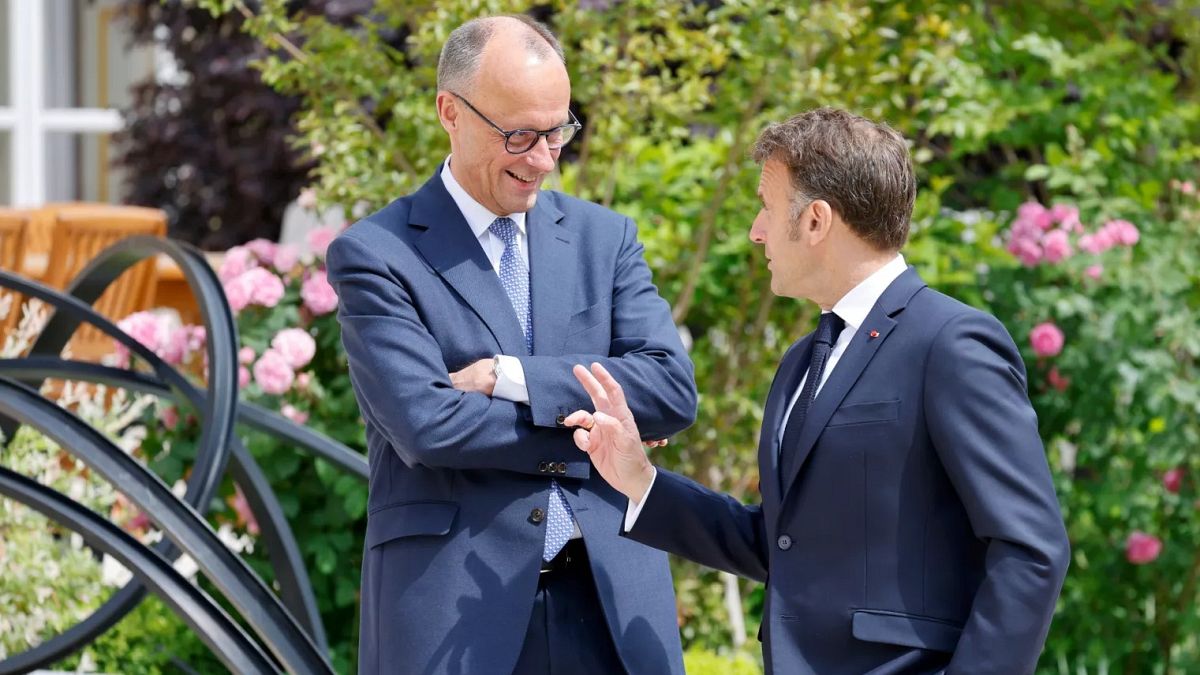
 World1 week ago
World1 week agoNew German chancellor aims for stronger EU ties with France and Poland
-

 Technology1 week ago
Technology1 week agoThe best iPad to buy
-
Indiana1 week ago
Star-filled roster for Team Indiana at Saturday’s Prep Ball Stars Midwest Challenge
-

 News1 week ago
News1 week agoJudge Orders Release of Rumeysa Ozturk, Tufts Student Detained by ICE
-

 Lifestyle1 week ago
Lifestyle1 week agoA Guide to Bravo’s New Shows, Including “Wife Swap: The Real Housewives Edition”
-

 Business1 week ago
Business1 week agoA Decade-Long Search for a Battery That Can End the Gasoline Era
-

 News1 week ago
News1 week agoTrump cuts tariffs on U.K. cars, steel and aluminum but keeps 10% base duty
